Oscars are voracious eaters. They are big fish with a big appetite. If something can fit in their mouths, it will usually end up there at some point. Oscars originate from rivers and streams of South America.
In the wild, their diet would undoubtedly be made up of small fish, insects and their larvae as well as small nuts and fruits, shrimp, and snails. Almost anything that ended up in their waters would be consumed.
Whilst there is no doubt a balanced, staple food such as a cichlid pellet (I use Hikari staple and Hikari gold as well as a lot of Bug Bites from Fluval), should make up the bulk of your Oscars diet in captivity, adding additional foods can have great benefits.
Firstly, it keeps feeding time interesting for you and your oscar, and secondly, feeding a variety of foods introduces a variety of different vitamins and minerals, which will have a long-term benefit for your oscar.
Below are 10 foods you may be surprised to read your oscar will not only eat but will enjoy. None of these should be used as an exclusive food, and not all oscar will eat all of them. But with a bit of trial and error, you will be able to vary up your Oscars diet and keep him interested at mealtimes.
- Shrimp
- Mealworms
- Earthworms
- Crickets
- Frozen Peas
- Peanuts
- Fruit
- Feeder Goldfish
- Mussels
- Repashy
1. Shrimp
Your oscar will quickly snap up both live shrimp, such as red cherry shrimp and ghost shrimp, or the frozen, cocktail shrimp you buy from the store.
If you have a separate aquarium, you can start a breeding colony of red cherry shrimp to feed to your Oscars as a treat. Keep them in a small aquarium with appropriate filtration, feed them well and they will give you an almost never-ending supply of free, healthy live food.
I tend to add the shrimp to my oscar tank 20 or 30 at a time. That way, whilst some are eaten instantly, others get to hide in rocks and behind decorations, providing your oscar the opportunity to seek them out during the rest of the day.
When feeding frozen cocktail shrimp from the store, take a couple of pieces out of the freezer and run them under cold water for a few seconds. Just long enough to defrost them completely.
Once defrosted, drop them in and watch your oscar go to town. Add a couple per oscar, just so there is no fighting.
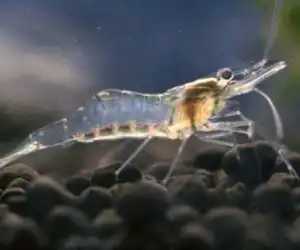
2. Mealworms
Mealworms can be purchased either live or dried. Your oscar will love them either way. I purchase live mealworms from my local pet store. Alternatively, you can have them sent through the post. Amazon has a surprising range of live foods available.
Offering live mealworms is a great way to add additional vitamins and minerals your oscar wouldn’t otherwise get. Keep your mealworms in a suitable container and feed the mealworms oats and fruit for a day or two before offering them to your Oscars. This ‘gut loading’ is probably the main benefit of feeding any live food.
When it comes to feeding the mealworms to your oscar, just drop one or two into the tank at a time. Once your oscar eats them, add another one or two. You can do this for a few minutes, but don’t overfeed your oscar. Mealworms are a fatty food and should be saved as a treat.
There have been stories of mealworms burrowing out of the fishes’ stomachs after they have been swallowed whole by the fish. This isn’t something we’ve witnessed first-hand, and Oscars are known to chewy their food to a pulp, so it shouldn’t be a concern.
Dried mealworms can be kept in an airtight container until ready to be used. You can soak them for a few minutes in a vitamin solution such as Vitachem.
Much like gut loading the live mealworms, this presents an opportunity to get goodness into your oscar he wouldn’t otherwise receive. Don’t add too many dried mealworms to the tank at a time as any uneaten ones will quickly foul your aquarium water.
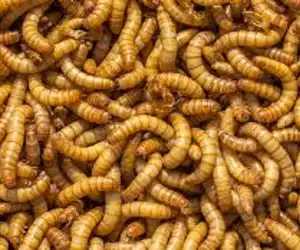
3. Earthworms
Earthworms make an excellent addition to your Oscars diet. It is very likely Oscars would consume earthworms in the wild. You can either order your earthworms online or simply dig them up in your backyard.
I wouldn’t recommend digging them up from locations you don’t own as the worms may have become contaminated with pesticides or other chemicals that you wouldn’t want your oscar to consume.
Only add a couple of worms at a time, but be cautious if you have more than one oscar in the tank. If two Oscars go for the same worm, it can be a real tug of war.
The worms will wriggle around in the water, attracting even the most reluctant feeder.
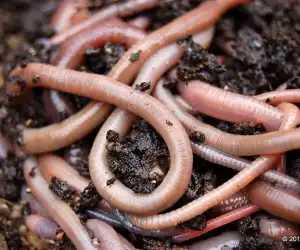
4. Crickets
Crickets are another excellent live food. When you purchase a box, bring them home and keep them in a suitable container for a supply of live food that will last several days, possibly weeks.
Like mealworms, crickets present an excellent opportunity to offer live food which has been gut loaded with goodness. Feed your crickets small pieces of fruit or vegetables and they will live happily until you are ready to feed them to your Oscars.
When I feed crickets to my Oscars, I place them one at a time on the surface of the aquarium water. Wait until your oscar has eaten one before adding the next one.
Keep feeding for a couple of minutes, but don’t allow your greedy oscar to gorge himself. Be aware, if the cricket can reach a dry surface he will pull himself out of the water and be away.
One word of caution when feeding crickets, if a cricket escapes and hides somewhere in your home, you’ll have that annoying ‘cricket’ sound inside your home for days, believe me, I’ve had it!

5. Frozen Peas
Feeding Oscar’s frozen peas is an excellent way to get additional vitamin C into their systems. We just throw a small handful of peas into the tank, still frozen is fine, and the Oscars seem to really enjoy them.
Frozen peas also offer your oscar a good source of roughage, helping them keep their insides moving on a regular basis. For small, juvenile Oscars, you can break the peas up a bit so they are in smaller, easier-to-consume pieces.
6. Peanuts
I have had Oscars in the past that will eat peanuts. There is no doubt that in the wild Oscars would have access to lots of tropical nuts and seeds that naturally fall into their waterways.
You could certainly try other nuts. With a bit of trial and error, adding a few small pieces at a time, you’ll soon work out which nuts and seeds your oscar will and won’t eat. As with all foods, just remove any uneaten items after a few minutes so they don’t rot in your tank.
If your Oscars are small, be sure to crush or break the peanuts up before feeding them to your Oscars.

7. Fruit
Much like with nuts, some Oscars really enjoy eating fruit. I’ve had some success in the past with bananas (cut into small pieces), grapes (again, just pieces), and chunks of watermelon.
Offer a small piece of fruit to your oscar and see what he does with it. If he scoffs it down, offer another small piece. If he’s not interested, remove the uneaten food and try something else. Just remember to offer small pieces. If you drop a whole banana into the tank, it’s going to foul your water long before your oscar gets a chance to eat it.
8. Feeder Goldfish
I am not a big fan of feeder goldfish or any feeder fish for that matter. When purchased from the store, feeder goldfish are often in a poor state and may well be riddled with diseases. They are generally treated so poorly by the aquarium hobby that, by the time you feed them to your Oscars, they offer little or no nutritional value.
With that said, there may be a time when you have no choice but to offer feeder goldfish. If that is the case, purchase them a few weeks ahead of time and keep them in a dedicated aquarium.
Give them medication to make sure they don’t have internal tapeworms or parasites and feed them lots of good quality food. The healthier your feeder goldfish, the more valve they are to your Oscar.
Other sources of live fish to feed your Oscar may include excess babies from a breeding project, such as a guppy colony, or the fish which have to be culled to keep your colony strong.
Don’t feed your oscar a sick member of the colony, but one that is physically deformed and needs to be removed from the gene pool will make a fine snack.
Whatever your source of live feeder fish, remember they are animals too and should be treated with respect, right up until they are fed to your Oscar.
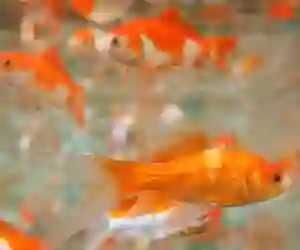
9. Mussels
Frozen mussel meat can be given to your Oscars from an early age. It comes in blister packs that you keep in the freezer.
Add a cube and small Oscars will pick the pieces of meat off as they defrost. Larger Oscars may swallow the whole frozen cube, but we’ve never found it to be a problem to them.
Whole frozen mussel meat is suitable for larger Oscars. Allow a few pieces to defrost before dropping them in the tank. You can buy frozen mussels in their shells, but Oscars aren’t really designed to open them.
10. Repashy
Many fish keepers have never heard of Repashy, but it is a fantastic food that can be fed to Oscars right from when they are small fry up until full-grown adults.
Repashy comes in powder form which you add to boiling water. Stir it, allow it to cool and set, then cut into cubes and feed it to your Oscars. It’ll keep for a few days in the fridge or several weeks in the freezer.
Repashy comes in a wide selection of flavors, (see here for the choices) but I’ve found my Oscars will eat all of them.
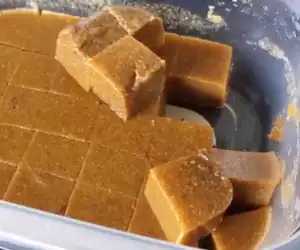
In Conclusion
When it comes to feeding your Oscars, variety is definitely the key. Variety keeps them interested at feeding times and helps provide them a balanced diet. A staple food should always form the backbone of their diet to keep them healthy and the rest should be offered sparingly. Just because your oscar would eat cocktail shrimp 4 times a day, every day doesn’t mean he should.
When trying any new food, offer a small amount to see if your oscar will eat it. If he does, you can offer a bit more. If he doesn’t remove the uneaten food and try again another day. We usually wait until an oscar has refused to eat an individual food 4 or 5 times before we stop offering it.







